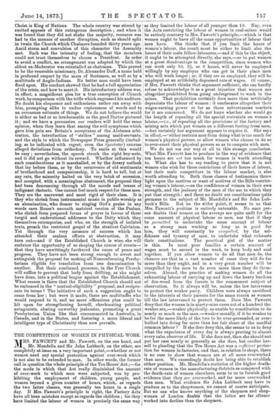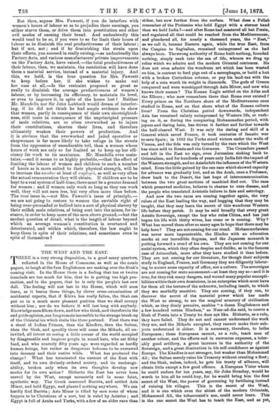• THE COMPETITION OF WOMEN IN PHYSICAL WORK.
MRS. FAWCETT and Mr. Fawcett, on the one hand, and Mr. Mundella and Sir John Lubbock, on the other, are comPletely at issue on a very important point,—whether or not women need any special protection against over-work which is not also to be extended to men. In other words, the former call in question the whole principle of the Ten Hours' Act ;—for the mode in which that Act really diminished the amount of over-work to which men were subjected, was by pro- hibiting the employment of children, young people, and women beyond a given number of hours, which, as regards the two latter classes, was generally ten hours in a single day. If Mrs. Fawcett's principle is right, the Factory Acts have all been mistakes except as regards the children ; for they have limited the labour of women in precisely the same way
as they limited the labour of all younger than 18. Nay, even the Acts restricting the labour of women in coal-mines would be entirely contrary to Mrs. Fawcett's principle,—which is that women ought to have all the same opportunities of labour that men have. She thinks that if you limit the hours of women's labour, the result must be either to limit also the hours of their male fellow-labourers,—and if this be the object, it ought to be attempted directly, she says,—or to put women at a great disadvantage in the competition, since women who can work only 10, 9A-, or 9 hours, will never be employed willingly by any employer who can. get in their place men who will work longer ; or, if they are so employed, they will be employed at an artificially depressed rate of wages. Of course, if Mrs. Fawcett thinks that argument sufficient, she can hardly refuse to acknowledge it as a great injustice that women are altogether prohibited from going underground to work in the mines. That prohibition certainly does more than artificially depreciate the labour of women ; it confiscates altogether their wages-earning power so far as these subterranean markets for it are concerned. We do not know whether she would go the length of repealing all the special restraints on women's labour,—i.e., of repealing all the provisions of the factory and mining acts which put women on a different footing from men, —but certainly her argument appears to require it. She says in effect,—'either restrain men from doing what is too much for women's physical powers, or allow women who choose to do so to over-exert their physical powers so as to compete with men.'
We do not see our way at all to this strange conclusion. What Mrs. Fawcett has to produce in the way of evidence that ten hours are not too much for women is worth attending to. What she has to say tending to prove that it is not women who wish for these restrictions of their hours of labour, but their male competitors in the labour market, is also worth attending to. Both these classes of testimonies throw light upon the motives or want of motives of the Bills restrict- ing women's labour,—on the confidence of women in their own strength, and the jealousy of the men of the use to which they put that strength ; and these no doubt are considerations quite germane to the subject of Mr. Mundella's and Sir John Lub- bock's Bills. But on the wider point, it seems to us that Mrs. Fawcett's position is entirely untenable. No sane per- son doubts that women on the average are quite unfit for the same amount of physical labour as men, nor that if they be permitted to undertake the same amount of labour as a strong man working as long as is good for him, they will constantly be compelled, by the sel- fishness and tyranny of men, to undertake what exhausts their constitutions. The practical gist of the matter is this. In most poor families a certain amount of
wages must be earned in the week, to keep body and soul together. If you allow women to do all that men do, the chances are that in a vast number of cases they will do far more than they ought, and in a very great number will be compelled by the men to do even more than they do them- selves. Abroad, the practice of making women do all the exhausting labour of carrying up and down the heavy burdens of fire-wood from the forests is the commonest subject of observation. So it always will be, unless the law intervenes to protect the weaker party. Children were always sacrificed to the interests of their parents for the same reason as women till the law intervened to protect them. Does Mrs. Fawcett deny that the woman is in ninety-nine cases out of a hundred the weaker sex,—weaker physically, as unable by constitution to do nearly so much as the man,—weaker morally, if it be weaker to be far the more likely of the two to be over-persuaded, or over- bullied into doing far more than her fair share of the needful common labour ? If she does deny this, she seems to us to deny what the experience of every day is always proving to almost every calm observer of life. If she does not, then she should not put her case nearly so generally as she does, but confine her- self to pleading that the Ten Hours Act was a suftcient protec- tion for women in factories, and that, in relation to shops, there is no case to show that women are at all more overworked than men. We exceedingly doubt her being able to establish either position. Mr. Mundella's statistics of the higher death- rate of women in the manufacturing districts as compared with the death-rate of women elsewhere, seem to us to furnish good evidence that they are overworked, and far more overworked than men. What evidence Sir John Lubbock may have to produce as to the shopwomen, we cannot of course anticipate. But no one who knows anything of the shopmen and shop women of London doubts that the latter are far oftener worked into decline than the shopmen.
But then, argues Mrs. Fawcett, if you do interfere with women's hours of labour so as to prejudice their earnings, you either starve them, or drive them into prostitution and other evil modes of earning their bread. And undoubtedly this would tend to be so, if you were to so far limit their hours of labour as to diminish the real productiveness of their labour ; bat if not, not ; and if by diminishing the strain upon their efforts, you succeed in really raising,—as undoubtedly the Factory Acts, and various manufacturers' private improvements on the Factory Acts, have raised, —the total productiveness of their labour, then, we maintain, the restriction will have done them a material service, instead of a material injury. And this, we hold, is the true question for Mrs. Fawcett to keep before her, if she wishes to make out her case at all,—Is the restraint proposed so great as really to diminish the average productiveness of women's labour, or by increasing its efficiency, to maintain its level, or even to improve it, in spite of the hours lost? Neither Mr. Mundella nor Sir John Lubbock would dream of interfer- ing, if he did not think he had ample evidence to show that women, partly in consequence of their own shortsighted- ness, still more in consequence of the unprincipled pressure of male relatives, are so often overworked as to injure their constitutions, shorten their lives, and therefore ultimately weaken their powers of production. And it is obvious that the overworked and jaded operative or shopwoman is far more likely to take refuge in the streets from the oppression of unendurable toil, than a woman whose hours of work are only so far limited as to keep up her effi- ciency for work to its maximum. Mr. Mandella even main- tains,—and it seems to us highly probable,—that the effect of limiting the labour of women and children to such a number of hours as is more suited to their physical strength, will be to increase the number at least of employe, as well as very often the actual remuneration they will obtain. If children are to be kept to a real system of half-time, there must be a greater demand for women ; and if women only work so long as they can work well, they will not earn less, but very often more than before. The true issue is,—not Mrs. Fawcett's issue of principle,— we are not going to restore to women the enviable right of being over-persuaded or bullied into a sort of physical slavery by their selfish male relatives, of being sent into the mines, for in- stance, in order to keep more of the men above ground,—but the modest question of detail, what is the length of labour beyond which an average woman's constitution is overtaxed and deteriorated, and within which, therefore, the law ought to keep them in spite of their relations, and sometimes even in spite of themselves



































 Previous page
Previous page